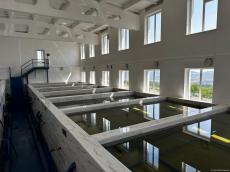|
|
TODAY.AZ / Politics
Water security initiatives in Shusha: Fostering prosperity in Garabagh
10 July 2024 [08:30] - TODAY.AZ
 Nazrin Abdul
Nazrin Abdul
Currently, extensive reconstruction efforts are underway in Garabagh and its surrounding regions as part of the ongoing post-war recovery. The implementation of the Great Return Program in liberated territories marks a significant milestone, focusing on the comprehensive rebuilding of Garabagh and Eastern Zangazur. This includes the establishment of new urban centers, modern trade hubs, logistics facilities, and economic zones.
The finalized master plan for liberated cities, including Shusha, enables the voluntary and safe return of internally displaced persons to their ancestral homes following a three-decade displacement period, achieved through the successful military operations led by President Ilham Aliyev and the Azerbaijani Army.
Immediate priorities post-liberation included the restoration of essential services, notably the drinking water supply in Shusha. The inauguration of the Shusha Drinking Water Purification Plant Complex on July 5th, attended by President Ilham Aliyev, reinstated crucial water supply infrastructure disrupted during the city's occupation.
Ilqar Salahov, head of the Garabagh Regional Water Canal Administration under the Azerbaijan Water Reserves Agency, reported swift repairs to damaged sections of the Kichik Kirs and Kichik Kirs-Shusha main water pipelines, restoring water supply to Shusha by November 25, 2020. Concurrently, efforts to repair the 14.3-kilometer Zarysly-Susha main water pipeline were completed, enabling water delivery to the city by December 20, 2020.
Addressing seasonal productivity challenges at the Kichik Kirs and Zarysly water intakes necessitated the creation of alternative water sources. A new reservoir, pump station, and 2.9-kilometer pipeline near Dashalti village were constructed along the Zarysly River to bolster water supply resilience.
Moreover, the inefficient segment of the 9.3-kilometer Kichik Kirs-Shusha main water pipeline was upgraded with larger diameter pipes, ensuring uninterrupted drinking water supply to homes, government buildings, hotels, and public facilities in Shusha from December 2022 onwards.
To maintain water quality compliance, the rehabilitation of the existing water purification plant in Shusha was initiated under the Invaluable Measures Program. Enhanced with 12 sand filters, internal communications, hydro-technical equipment, reagent facilities, and a production laboratory, the plant now operates at increased daily capacity, supplying potable water that meets rigorous standards to over 3,500 residents and visitors.
Future initiatives include constructing a new advanced purification plant to elevate Shusha's water supply resilience to 8,000 cubic meters daily, alongside ongoing efforts to build three water reservoirs totaling 6,000 cubic meters.
Projected development plans for Shusha encompass comprehensive reconstruction of water supply, sewage, and stormwater systems, guided by meticulous technical and economic assessments set for completion by October.
Dilqam Sharifov of the Melioration and Water Management ASC indicated 37% progress in preparatory work, including proposals for alternative pipeline directions from the Hekericay reservoir, with a storage capacity of 91 million cubic meters. Originating in the Lachin region, the Hekeri River spans 113 kilometers, serving a substantial area with an annual flow rate of 10.7 cubic meters per second, anticipated to benefit nearly 3 million people upon full implementation.
These concerted efforts underscore Azerbaijan's commitment to sustainable reconstruction, fostering resilience, and ensuring long-term prosperity for the liberated territories, notably Shusha, as integral components of its post-war development strategy.
Following the successful liberation of these territories, significant strides have been made in rebuilding essential infrastructure, restoring vital services like the drinking water supply, and facilitating the return of displaced individuals to their homes after decades of conflict-induced displacement.
Implementing the Great Return Program has been pivotal in this process, enabling the formulation of master plans for liberated cities and laying the groundwork for sustainable socio-economic development. Initiatives such as the inauguration of new purification plants, repair of damaged pipelines, and construction of modern water infrastructure highlight Azerbaijan's commitment to enhancing the quality of life and ensuring long-term stability in the region.
Looking ahead, ongoing projects aimed at increasing water supply reliability and expanding infrastructure display Azerbaijan's dedication to fostering resilience and prosperity in Garabagh and surrounding areas. These efforts not only aim to rebuild physical infrastructure but also to rebuild communities, fostering a sense of stability, prosperity, and hope for the future.
URL: http://www.today.az/news/politics/250480.html
 Print version
Print version
Connect with us. Get latest news and updates.
See Also
- 05 April 2025 [17:10]
Azerbaijani Defense Minister holds high-level military service meeting - 05 April 2025 [16:35]
Azerbaijan, Pakistan brainstorm interparliamentary relations - 05 April 2025 [16:20]
President of Uzbekistan makes phone call to President Ilham Aliyev - 05 April 2025 [13:25]
Euronews highlights Azerbaijan’s landmine challenges in special report - 05 April 2025 [12:47]
Relocation to Suqovushan village begins: 53 families to move - 05 April 2025 [10:00]
Briefing dedicated to humanitarian mine action in Azerbaijan held at UN - 04 April 2025 [14:34]
Azerbaijan, Russia mark 33rd anniversary of diplomatic ties with renewed commitment to alliance - 04 April 2025 [13:21]
Landmine toll reaches 388 in post-war Azerbaijan - 04 April 2025 [12:58]
Trial of Armenian-origin individuals accused of war crimes continues in Baku - 04 April 2025 [11:59]
Azerbaijan slams Armenia over unreliable landmine maps, urges international action
Most Popular
 UK, Poland and Northern Europe want to create joint defense fund
UK, Poland and Northern Europe want to create joint defense fund
 Azerbaijan, Russia mark 33rd anniversary of diplomatic ties with renewed commitment to alliance
Azerbaijan, Russia mark 33rd anniversary of diplomatic ties with renewed commitment to alliance
 China deeply regrets, rejects Fitch Ratings downgrade
China deeply regrets, rejects Fitch Ratings downgrade
 Pezeshkian’s visit to Baku comes at critical time for Azerbaijan-Iran relations
Pezeshkian’s visit to Baku comes at critical time for Azerbaijan-Iran relations
 April battles: the shame of the Armenian army and the triumph of Azerbaijan
April battles: the shame of the Armenian army and the triumph of Azerbaijan
 Underperformer strikes back
Underperformer strikes back
 Baku to host 6th Azerbaijan-Moldova intergovernmental commission meeting and business forum
Baku to host 6th Azerbaijan-Moldova intergovernmental commission meeting and business forum
